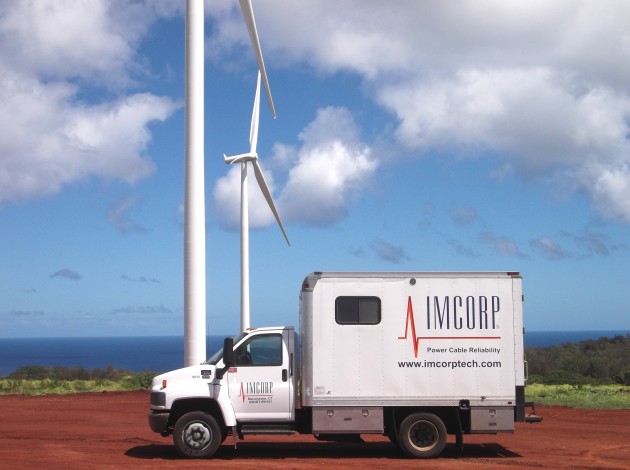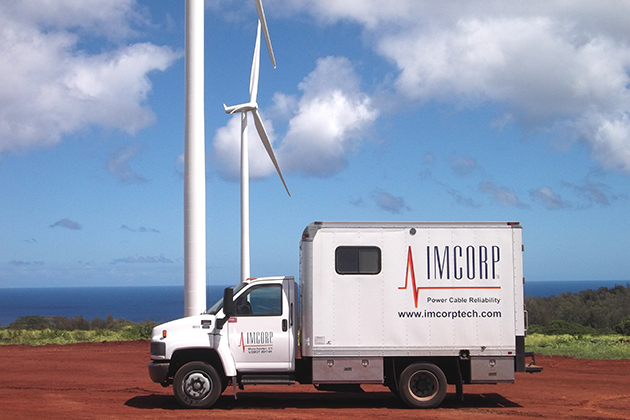This story is part of a package that illustrates a report on the economic impact of the University. For additional related stories, see ABCs for a Successful Workforce and Tiny Heart Valve Has Big Potential for UConn Startup.

IMCORP, a company built on technology developed at the University of Connecticut, has been recognized by INC. Magazine as one of the fastest-growing engineering companies in the U.S. for six years running.
It all started with an idea.
As a veteran engineer working in the utility industry in the early 1980s, UConn professor emeritus Matthew Mashikian saw a need for more reliable cable testing, as more than two billion feet of decades-old buried utility lines began nearing the end of their design life. Utility companies at the time were relying on what Mashikian calls a “sledge hammer approach” – testing cables by subjecting them to extreme voltage levels. If the cables survived the test, they were deemed reliable.
But he saw that the tests themselves could weaken cables and ultimately cause failure.
“We set out to make a test that was nondestructive,” Mashikian says. “A distressed cable gives off a very small pulse, like an arc. We call it a partial discharge. By using very sensitive sensors, we are able to pick up that electrical signal and capture it on the outside.”

The company Mashikian started in 1995 is now a national leader in improving the reliability of underground power cables.
IMCORP’s patented Factory Grade test process has helped utility companies realize a 98 percent reduction in failures of aged distribution cables, and up to 70 percent savings on the cost of replacement cables, according to the company’s website.
The technique allows companies to isolate damages and replace sections of cable rather than the entire line, resulting in significant cost savings that can be passed on to consumers. Repairs recommended by IMCORP often cost in the tens of thousands of dollars, compared to alternate options that could easily soar into the hundreds of thousands of dollars.
Mashikian began creating what would become the Factory Grade test process in UConn laboratories with a team of collaborating professors when he joined the School of Engineering as a professor in 1983. By the time he retired from the University, he had secured more than a dozen patents.
With assistance from UConn’s Technology Incubation Program (TIP), Mashikian launched IMCORP in 1995 in a building near UConn’s main campus in Storrs. Seeking more space, the company moved to its current Manchester headquarters in 2010. This year, 2014, IMCORP was identified as the fastest-growing private engineering firm in New England. With an average annual rate of growth of more than 40 percent, corporate revenues have jumped from $6 million in 2009 to nearly $15.3 million in 2013.

Company officials say that IMCORP engineers have tested more than 90 million feet of power cable over the past two decades, while saving the utility industry more than $250 million. IMCORP has service contracts with major utility companies in Texas, Florida, California, North Carolina, and South Carolina, and has conducted testing for utilities in 46 states. IMCORP’s primary service is in the utility industry, although it also provides tech support for about 60 percent of all the wind power stations in the United States. Reliable cable is critical for wind farms.
“If a wind farm has a single failure in a cable, it can take out 10 to 50 turbines until they find the fault and repair it,” Mashikian says. “The cost for finding the fault and repairing it is peanuts, but the cost of losing all that revenue is tremendous. We charge them a fraction of that to do the work.”
IMCORP has 85 employees stationed around the U.S. It even has staff in Belgium, where it is seeking a foothold in the European market. The company is proud of its UConn connections. Nearly 40 percent of the workers at its company headquarters are UConn graduates, and all of the company’s interns come from UConn.
“I am surrounded by young, enthusiastic, bright people, and I keep myself young by working with them,” says Mashikian, who proudly maintains an office inside IMCORP’s engineering wing rather than in the administrative wing with other managers. “We are coming up with three to four technologies right now that are going to shake the nation. As my father used to say, ‘If you don’t advance, you go backwards.’”
Mashikian says he is grateful for the support and opportunities provided by UConn that allowed IMCORP’s patented technology to be created and ultimately commercialized.
As the state’s flagship university, UConn has the knowledge base and high-end equipment to continue to serve as a leader in Connecticut innovation and job creation, Mashikian says. The University’s many distinguished researchers must continue to work with private industry to address problems and improve technology.
“Businesses are here to make money,” Mashikian says. “If they need a certain technology to make money, they have three options: they can make it themselves, they can buy it if it already exists, or they can have someone else make it for them. That’s where universities can provide the resources to do that.”
IMCORP is one example of how a university’s knowledge and leadership can directly impact a state’s economy.
“This little old company, because of an innovation developed two decades ago, has created more than 75 jobs in the state of Connecticut,” says Bruce Broussard, IMCORP president. “We pay taxes, and each individual who works for us pays taxes. Out of one person at UConn, there is so much potential for this state.”



